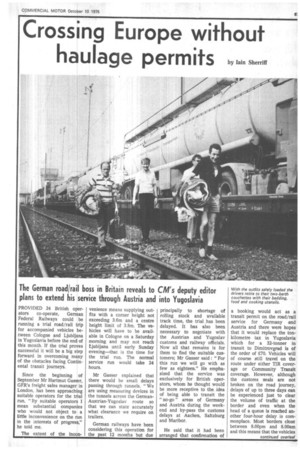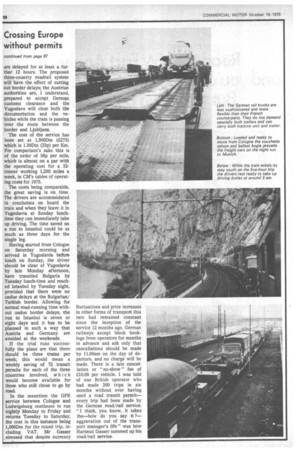Crossing Europe without
Page 69

Page 70

If you've noticed an error in this article please click here to report it so we can fix it.
haulage permits by lain Sherriff PROVIDED 24 British operators co-operate, German Federal Railways could be running a trial road/rail trip for accompanied vehicles between Cologne and Ljubljana in Yugoslavia before the end of this month. If the trial proves successful it will be a big step forward in overcoming many of the obstacles facing Continental transit journeys.
Since the beginning of September Mr Hartmut Gasser, GFR's freight sales manager in London, has been approaching suitable operators for the trial run, "By suitable operators I mean substantial companies who would not object to a little inconvenience on the run in the interests of progress," he told me.
The extent of the incon venience means supplying outfits with a corner height not exceeding 3.6m and a centre height limit of 3.8m. The vehicles will have to be available in Cologne on a Saturday morning and may not reach Ljubljana until early Sunday evening—that is the time for the •trial run. The normal service run would take 24 hours.
Mr Gasser explained that there would be small delays passing through tunnels. "We are using measuring devices in the tunnels across the GermanAustrian-Yugoslav route so that we can state accurately what clearance we require on trailers.
German railways have been considering this operation for the past 12 months but due principally to shortage of rolling stock and available track time, the trial .has been delayed. It has also been necessary to negotiate with the Austrian and Yugoslav customs and railway officials. Now all that remains is for them to find the suitable customers; Mr Gasser said : "For this run we will go with as few as eighteen." He emphasised that the service was exclusively for British operators, whom he thought would be more receptive to the idea of being able to transit the " no-go " areas of Germany and Austria during the weekend and by-pass the customs delays at Aachen, Saltzburg and Maribor.
He said that it had been arranged that confirmation of a booking would act as a transit permit on the road/rail service for Germany and Austria and there were hopes that it would replace the tonkilometre tax in Yugoslavia which for a 32-tonner transit to Dimitrovgrad is of the order of £70. Vehicles will of course still travel on the route under either TIR coverage or Community Transit coverage. However, although the customs seals are not broken on the road journey, delays of up to three days can be experienced just to clear the volume of traffic at the border and even when the head of a queue is reached another four-hour delay is commonplace. Most borders close between 8.00pm and 8.00am and this means that the vehicles are delayed for at least a further 12 hours. The proposed three-country roadrail system will have the effect of cutting out border delays; the Austrian authorities are, I understand, prepared to accept German customs clearance and the Yugoslays will clear both the documentation and the ye'hides while the train is passing over the route between the border and Ljubljana.
The cost of the service has been set at 1,500Dm (£273) which is 1.30Dm (23p) per Km. For comparison's sake this is of the order of 36p per mile, which is almost on a par with the operating cost for a 32 tonner working 1200, miles a week, in CM's tables of operating costs for 1975.
The costs being comparable, the great saving is on time. The drivers are accommodated in couchettes on board the train and when they leave it in Yugoslavia at Sunday lunchtime they can immediately take up driving. The time saved on a run to Istanbul could be as much as three days for the single leg.
Having started from Cologne on Saturday morning and arrived in Yugoslavia before lunch on Sunday, the driver should be clear of Yugoslavia by late Monday afternoon, have transited Bulgaria by Tuesday lunch-time and reached Istanbul by Tuesday night, provided that there were no undue delays at the Bulgarian/ Turkish border. Allowing for normal road-running time without undue border delays, the run to Istanbul is seven or eight days and it has to be planned in such a way that Austria and Germany are avoided at the weekends.
If the trial runs successfully the plans are that there should be three trains per week; this would mean a weekly saving of 72 transit permits for each of the three countries involved, which would become available for those who still chose to go by road.
In the meantime the GFR service between Cologne and Ludwigsburg continues to run nightly Monday to Friday and returns Tuesday to Saturday, the cost in this instance being 1,066Dm for the round trip, including VAT. Mr Gasser stressed that despite currency fluctuations and price increases in other forms of transport this rate had remained constant since the inception of the service 12 months ago. German railways accept block bookings from operators for months in advance and ask only that cancellations should be made by 11.00am on the day of departure, and no charge will be made. There is a late cancellation or " no-show " fee of E10.00 per vehicle. I was told of one British operator who had made 200 trips in six months without ever having used a road transit permit— every trip had been made by the German road/rail service. "1 think, you know, it takes the—how do you say it ?aggravation out of the transport manager's life" was how Hartmut Gasser summed up his road/rail service.




































































































































